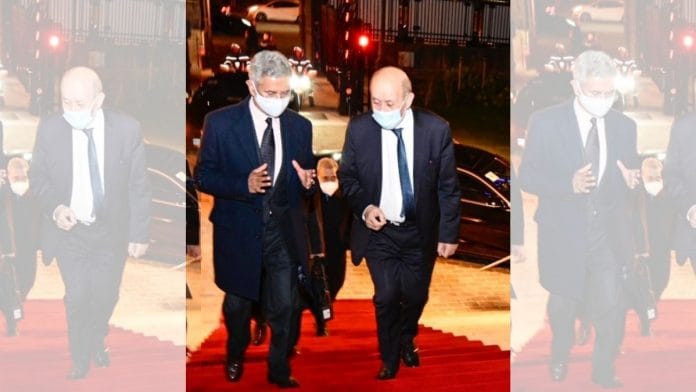New Delhi: India is expected to come under pressure from European countries at the Ministerial Forum for Cooperation in the Indo-Pacific, which is scheduled to take place in Paris Tuesday. The reason is the question on what position New Delhi will take on the deepening crisis between Russia and Ukraine.
Russian President Vladimir Putin ordered the deployment of troops to two breakaway regions in eastern Ukraine after recognising them as independent on Monday.
External Affairs Minister S. Jaishankar, who is currently visiting Paris, will attend the ministerial forum Tuesday, which will also see participation by foreign ministers of all EU countries and 30 countries from the Indo-Pacific.
France, which holds the European Union Presidency for this year, is playing an active role in calming down tensions between Moscow and Kyiv, even as French President Emmanuel Macron had invited a summit meeting of sorts between US President Joe Biden and Russian President Vladimir Putin, which the Kremlin ruled out Monday.
The evolving situation in Ukraine was one of the key issues that was discussed during Jaishankar’s bilateral meeting with his French counterpart Jean-Yves Le Drian Monday.
“Arrived in Paris. Held wide-ranging and productive talks with FM @JY_LeDrian. Discussions on bilateral cooperation, Ukraine situation, Indo-Pacific and JCPOA reflected our deep trust & global partnership. Look forward to participating in the EU Ministerial Forum on Indo- Pacific,” Jaishankar tweeted Monday.
Arrived in Paris.
Held wide-ranging and productive talks with FM @JY_LeDrian.
Discussions on bilateral cooperation, Ukraine situation,Indo-Pacific and JCPOA reflected our deep trust & global partnership.
Look forward to participating in EU Ministerial Forum on Indo- Pacific. pic.twitter.com/qo5PX3fAsA
— Dr. S. Jaishankar (@DrSJaishankar) February 20, 2022
Later in the day, Jaishankar also met French Defence Minister Florence Parly.
Pleasure to meet Defence Minister @florence_parly.
As trusted strategic partners, discussed contemporary developments. Convergence in our outlook and interests was visible.
Affirmed our commitment to cooperate on new and emerging security challenges. pic.twitter.com/eHmWzExCCF
— Dr. S. Jaishankar (@DrSJaishankar) February 21, 2022
Jaishankar is expected to clarify India’s stand in the deepening Russia-Ukraine crisis. India will also seek support for itself against China, while it continues to remain engaged in a border stand-off at the Line of Actual Control (LAC), diplomatic sources told ThePrint.
Sources also said that the ministerial forum, which is a first-of-its-kind gathering of countries, will also give out some “strong signals” on China by way of adoption of the joint roadmap on blue economy and oceans governance, which will “work in India’s favour”.
Ukraine crisis similar to Chinese belligerence?
According to the sources, the EU does not see the crisis in Europe separately from what the Indo-Pacific countries are witnessing with increasing Chinese belligerence. Hence, it wants countries like India to take a “stand” on the Ukraine crisis, which it believes is one of the biggest crises facing Europe in recent times.
“New Delhi has been apprised of all its concerns regarding Russia amassing troops at the Ukrainian borders,” said a diplomat from the European Union.
The EU believes as a “like-minded” partner in the Indo-Pacific, India has to take a stand against Russia, asserting a “rules based system of world governance, which is in the interest of all” — hinting at the fact that India would also need support from European countries while confronting China, the diplomat said.
Jaishankar has already ruled out any kind of similarity between the two, at the Munich Security Conference Saturday. “I don’t think these situations in the Indo-Pacific and the Transatlantic are really analogous and certainly the assumption… that somehow there’s a trade-off and one country does this in the Pacific, so in return you do something else. I don’t think that’s how international relations work,” the external affairs minister said.
“We have, I think, quite distinct challenges — what’s happening here, what’s happening in the Indo Pacific,” he added.
Addressing the UN Security Council on the Ukraine crisis last Thursday, India’s Ambassador to the UN, T.S. Tirumurti, had urged a diplomatic solution to the matter. “Any steps that increase tension may best be avoided by all sides in the larger interest of securing international peace and security. Quiet and constructive diplomacy is the need of the hour,” Tirumurti had said.
In a joint statement last week, France and Germany had said, “The increase in ceasefire violations along the line of contact in recent days is highly concerning. We condemn the use of heavy weaponry and indiscriminate shelling of civilian areas, which constitute clear violation of the Minsk agreements … We continue to express our grave concern about Russia’s massive build-up of armed forces in and around Ukraine and call on Russia to contribute to de-escalation by a substantial withdrawal of military forces from the proximity of Ukraine’s borders.”
According to Rajiv Bhatia, former diplomat and an expert on the Indo-Pacific, “on Ukraine, EU may expect India to be sympathetic, but putting pressure to elicit public support may be unproductive”.
“The key issue in the Indo-Pacific deliberations is an enhancement of the EU’s role to face the China challenge. If privately there is progress, the EU may say what it likes in public. But if the EU lacks courage to be assertive towards Beijing and remains Euro-centric, India and other Quad powers (India, US, Japan and Australia) will be free to draw their own conclusions,” Bhatia added.
(Edited by Poulomi Banerjee)
Also read: No, Russia-India chasm isn’t deepening with Ukraine. It counters US’ divide-and-rule ploy






